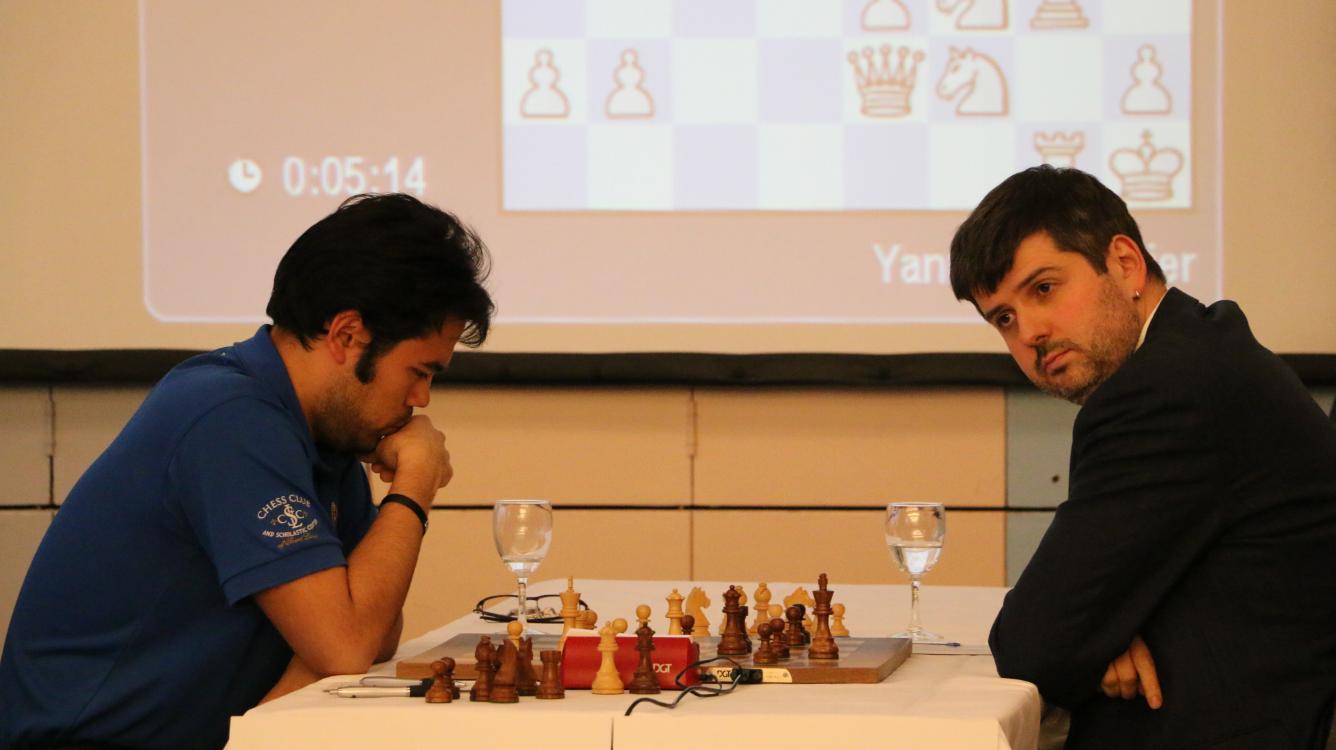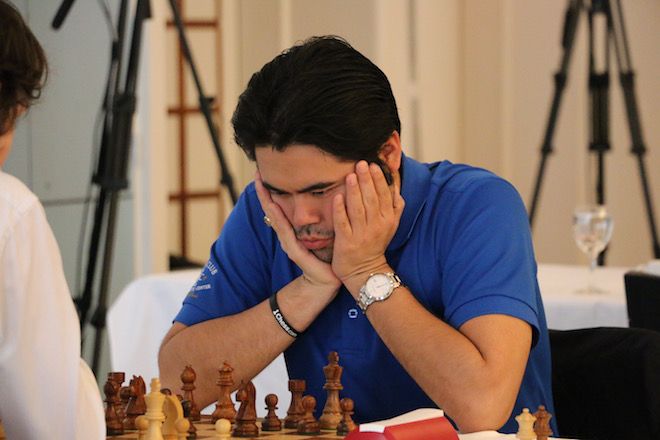
Svidler Beats Nakamura; 4-Way Race In Zurich
Everything looked primed for GM Hikaru Nakamura to jump out to sole first place at the end of the second day of "new classical" games at the Korchnoi Zurich Chess Challenge. Then GM Peter Svidler interjected.
He had not defeated the American in more than five years, but turned around a bleak position today to take the full point and create a jumble at the top.

Like close tournaments? Thank this guy, even though in an interview with Chess.com he said he was "bumbling" along like the Pink Panther.
Besides Svidler and Nakamura, two others are on +1 and in a four-way tie for first: GM Ian Nepomniachtchi and GM Vladimir Kramnik. You could also make the case the Kramnik deserved, or at least made a good effort for the lead. In the early round, he couldn't win with an extra piece, otherwise he'd have the lead, and the lede!
Years ago, someone dubbed part of the top-level round robin in southern Spain the "Linares Open," meaning the elite players would try their best to rack up points against the players at or below 2700. For the first two rounds in Zurich, GM Hikaru Nakamura played the "Korchnoi Open" to perfection.

GM Hikaru Nakamura was having a good three days in Zurich until Friday evening.
After beating the bottom seed yesterday, this afternoon began with a convincing display of power over the second-to-last seed. Although he missed a rare en prise tactic, Nakamura still went on to beat GM Grigoriy Oparin and begin 2-0. The alternative scoring system awarded Nakamura four points for the perfect start (the tournament's closing blitz tournament will count games for the traditional one point, and the combined events determine final placement).
"It's not like I hadn't heard of him before," Nakamura told Chess.com about preparing for Oparin. The two drew their classical game in Gibraltar 2016.
"He earned his way here," Nakamura said. (Svidler: "I don't know him that well but I rate him very highly.")
Whereas Nakamura's two wins came convincingly, GM Vladimir Kramnik couldn't keep up the same form as his opening-round conversion the night before. Had he finished off his winning position, he would have equaled Nakamura on score and cleared a tougher portion of the draw to boot.
The disparity was so winning that GM Viswanathan Anand, joining the commentary, gave only a cursory glance and said bluntly, "A piece is a piece."

"I just drew a former world champion, down a piece!?" GM Ian Nepomniachtchi might be thinking.
Svidler, who admitted he was no stranger to being strangled by an advancing Kramnik d-pawn, said, "He will win this in his sleep...I'm having unpleasant flashbacks here. I've seen this movie."
He didn't specify except to say it was a Grunfeld, and this author's best guess is this Kramnik masterpiece.
Nakamura didn't cite this game, but in his view, imperfect games are what make chess worth playing.
"In order for chess to be more interesting, you have to have more blunders," he told Chess.com.
"The odds of making a mistake are like 20 percent [in classical]. That's why there are so many draws."

GM Vladimir Kramnik must have missed a spot while cleaning his glasses. At some point, he had a blockage.
"Twenty years ago, perfection in a sense was going home with your seconds and studying for over the board," he said. But the concept of near-flawless play has changed since computers have scripted so many of chess's dramas in the last few decades.
"The notion of 'perfection' has to go out the window, if you accept that chess is a draw, which I think it is."
Anand played perhaps the most interesting game of round two. He expanded on the kingside with 14. g4, only to get provoked by 14...h5. The move and response are the inverse of the King's Indian Defense, something GM Yannick Pelletier mentioned to Anand after the game.

After the game, Anand may have inadvertently explained why he played with all the energy -- he has it in reserve. Inactive for the first three months of the year, he won't play competitive chess again after Zurich until June's Norway Chess.
Svidler-GM Boris Gelfand had a funny story. They repeated Svidler's draw with GM Fabiano Caruana from the 2016 Candidates' Tournament. Sure, Svidler varied from that game, but Gelfand knew the equalizing line since he analyzed the stem game last year and found the antidote as it happened. It pays for pros to watch real-time broadcasts it seems!

Speaking of broadcasts, remember who became a minor chess celebrity at the 2016 World Championship? GM Sergey Karjakin's manager Kirill Zangalis became an unlikely coveted interview with Norwegian television, but today, he was in the press room playing on his favorite chess site...

...Chess.com. And because we know how our readers think, no, in the above picture, GM Gennady Sosonko was not helping.
Despite the experimental time control of 45+30, three of the four games in the early session went longer than two hours. When the players reconvened for the 5 p.m. session, all four games ended up going longer than that threshold. Lovers of endgames got their wish.
Amid a lot of talk about pawn islands, Anand looked to have a chance for a perfect day until his four pawns all became lone soldiers.
"I didn't do anything in the opening," Nepomniachtchi said of the offbeat beginning. "I just wanted to offer a draw, then I realized it's Sofia Rules...In the short time control, I shouldn't give up on my position so quick."
But that was nothing compared to Svidler's reversal of fortune against the pre-round tournament leader.
"Don't try this at home," was his warning to viewers. "Don't try to play this line...The position I had out of the opening, you usually grovel for a few hours and then perhaps not lose."

GM Peter Svidler, arriving with GM Viswanathan Anand.
His saving grace was that same fundamental axiom of chess. "The old Soviet school of counting the pawn islands -- the old rule holds true," he said. Like golf, lower numbers are better, and Svidler at least had that going for him.
Nakamura overplayed his hand on the f-file, and the blockading/discovered defense tactic 23...Nf5 swung the initiative to Black for the first time all game. Svidler did not relent.
Chess.com conducted a video interview with Svidler:
You can watch round four and five live, which take place at 12:30 p.m. CET and 5:00 CET Saturday. Rounds six and seven will be Sunday, with the closing blitz tournament beginning at 11 a.m. CET Monday. The commentary can be found at the official site or at Chess.com/TV.
Previous reports:

